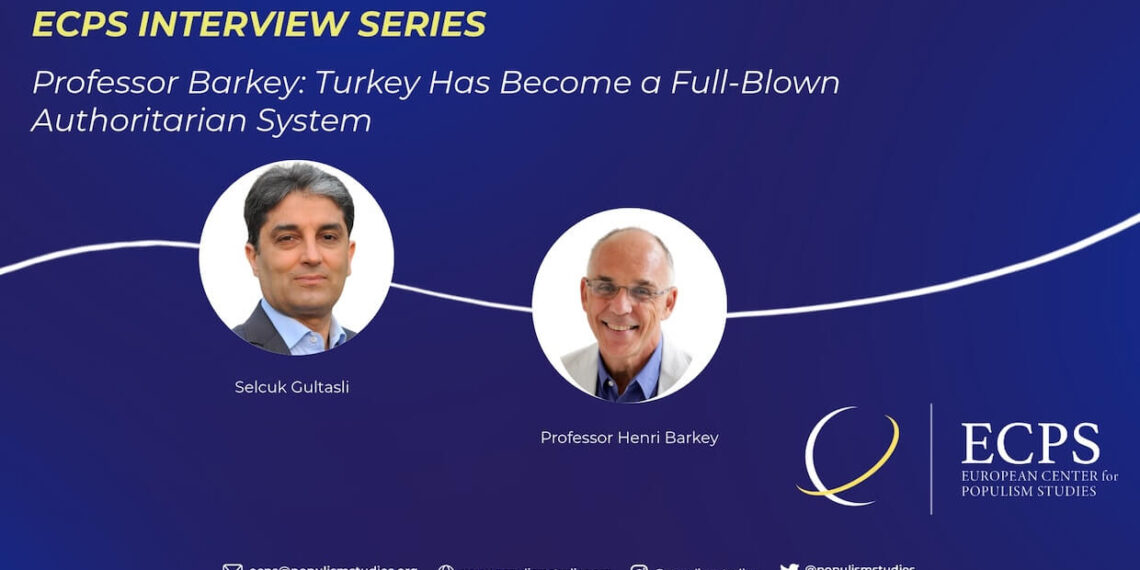In an interview with the ECPS, Professor Henri Barkey—born in Turkey and one of the leading US experts on Middle East politics—warns that Turkey has crossed a decisive threshold under President Erdogan. “Turkey has now become a full-blown authoritarian system,” he stated, arguing that Erdogan has removed the “competitive” element from competitive authoritarianism by subordinating the judiciary, jailing rivals, and even deciding opposition party leadership. While repression deepens, Professor Barkey sees a paradox: “The system is becoming more authoritarian, but society may be resisting much more than we realize.” He highlights youth-led mobilization, fears over arrested Istanbul Mayor Ekrem Imamoglu’s popularity, and Europe’s limited leverage, concluding that Erdogan’s overreach may ultimately galvanize opposition forces.
Interview by Selcuk Gultasli
In a wide-ranging interview with the European Center for Populism Studies (ECPS), Professor Henri Barkey, a leading scholar of Middle East politics who was born in Turkey, delivered a stark assessment of the country’s current trajectory under President Recep Tayyip Erdogan. “Turkey has now become a full-blown authoritarian system,” Professor Barkey stated, emphasizing that the transition from “competitive authoritarianism” to outright authoritarian rule marks a dangerous turning point.
Professor Barkey—Adjunct Senior Fellow for Middle East Studies at the Council on Foreign Relations and holder of the Bernard L. and Bertha F. Cohen Chair in International Relations at Lehigh University—has long studied Turkey’s political development. He previously directed the Middle East Center at the Wilson Center and served on the US State Department Policy Planning Staff during the Clinton administration.
Professor Barkey situated Erdogan’s consolidation of power within a broader historical and political context. Turkey’s modern history, he observed, has been marked by cycles of democratic openings and authoritarian retrenchment. Yet, despite repeated interruptions—from military coups to autocratic turns—“the Turkish public, by and large, has adapted and adopted a sense of democratic culture.” The resilience of ordinary citizens, he noted, remains a crucial counterweight to authoritarian encroachment.
At the heart of Professor Barkey’s argument is Erdogan’s dismantling of institutional safeguards. “He is turning Turkey into a complete authoritarian system because he controls the judiciary, and judges and prosecutors essentially do whatever he wants them to do,” Professor Barkey explained. Recent episodes—politically motivated trials, the dismissal of opposition leaders, and the manipulation of party leadership contests—demonstrate, in his view, the collapse of even the minimal competition that previously characterized Turkey’s hybrid regime. “In other words, Erdogan is now deciding who will lead the main opposition party.”
This tightening grip, however, is not without risk. Professor Barkey underscored a paradox: “There’s a kind of dialectic here: the system is becoming more authoritarian, but society may be resisting much more than we realize.” Millions of citizens, particularly the younger generations who have never known a Turkey without Erdogan, have mobilized in protests, demanding change. Professor Barkey noted that such resistance is difficult to gauge because “people are afraid to speak out” and reporting is restricted, but he insisted that “at some point, this is going to break.”
Erdogan’s own fear of rivals, especially Istanbul Mayor Ekrem Imamoglu, reflects this tension. Professor Barkey argued that the regime’s extraordinary measures to sideline Imamoglu—ranging from imprisonment to retroactive annulment of his university degree—offer “the clearest demonstration that he’s terrified.”
Professor Barkey also highlighted the role of external actors in shaping Erdogan’s room for maneuver. In his view, former US President Donald Trump “doesn’t believe in democracy” and effectively gave Erdogan “carte blanche” at home by refusing to criticize his repression. Europe, for its part, remains uneasy with Erdogan’s authoritarian aims and worried about migration pressures, but Professor Barkey noted that Erdogan feels confident he can “withstand European pressure” while focusing on demolishing the opposition. Ultimately, the combination of a permissive US stance under Trump and Europe’s limited leverage has reinforced Erdogan’s sense of impunity.
Ultimately, Professor Barkey’s analysis suggests both danger and opportunity: the danger of entrenched authoritarianism, but also the possibility that Erdogan’s overreach may galvanize opposition forces. As he concluded, “Authoritarian leaders always make mistakes… and I think Erdogan is already making them.”


